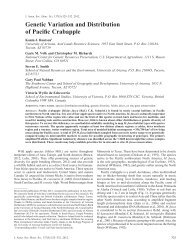CONSERVATION
Conservation You Can Taste - The Southwest Center - University of ...
Conservation You Can Taste - The Southwest Center - University of ...
- No tags were found...
You also want an ePaper? Increase the reach of your titles
YUMPU automatically turns print PDFs into web optimized ePapers that Google loves.
A SPUD UNLIKE THE OTHERS:<br />
Ups and Downs in the Life of the Makah Ozette Potato<br />
Joy Vargo, with Gary Nabhan, Gerry Warren,<br />
Marlys Bedlington and Nancy Turner<br />
THE MAKAH OZETTE<br />
POTATO, still rare if<br />
not threatened, is by far<br />
the brightest star in the<br />
unique constellation<br />
of potatoes found in<br />
North America today.<br />
Along with the Kasaan<br />
and Maria’s potatoes<br />
of Southeast Alaska<br />
and British Columbia,<br />
the Makah Ozette appears to have been brought<br />
directly to the Pacific Northwest through Mexico,<br />
and indirectly from either Peru or Chile. Nearly all<br />
other potatoes now grown in the U.S. came from<br />
introductions out of Europe and the British Isles, long<br />
after their departure from the Andean highlands. The<br />
Spanish-transported ancestor of this potato landed<br />
around 1791 on the shores of Neah Bay, near the<br />
Makah Indian village of Ozette, on the Olympic<br />
Peninsula in Washington.<br />
The Spanish failed<br />
to maintain a long-term<br />
presence at Neah Bay<br />
after the first winter<br />
in the harbor proved<br />
too severe for the<br />
conquistadors’ ships to<br />
withstand, and so they<br />
left the region, but the<br />
potatoes were hardy<br />
enough to survive. The<br />
spuds the Spanish had planted in their summer<br />
garden persisted and soon went feral after the fort<br />
was abandoned. Legend has it that the Makah Ozette<br />
potato was discovered and adopted by women of the<br />
Makah Nation when they were out foraging in 1792.<br />
Unbeknownst to anyone outside of their culture, for<br />
the next two centuries Makah women took on the<br />
role of serving as the sole stewards of their newly<br />
found tuber crop, clandestinely cultivating the potato<br />
in modest gardens on the rainforest edge.<br />
28



